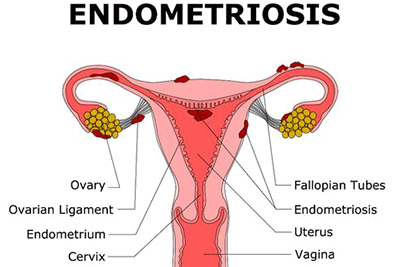
Endometriosis is a benign disease that consists of the appearance and growth of endometrial tissue. This pathological entity occurs in the uterine cavity and outside this organ; reason why it causes alterations in the quality of life and also in the reproductive capacity of women.
This pathology appears more frequently in the ovaries and uterine tubas, and it can even spread to underlying structures such as the bladder and intestine, causing inflammation, pain and in some cases it can present areas with fibrosis, which leads to fertility problems. 50% of women who present endometriosis are asymptomatic, while the other half do have symptoms and are characterized by:
 Painful menstrual periods.
Painful menstrual periods.- Pain when having sex.
- Bleeding in stool or urine.
Endometriosis is frequent and affects up to 10% in women who have their first menstrual period and at menopause, however 25% of women who come for a fertility problem may have it. When it affects the ovaries, they may have small implants or blood cysts “chocolate cysts” or “endometrioma”, of variable size, ranging from millimeters to centimeters.
Today there are many theories of how this disease affects fertility or how it delays conception; there appear to be several mechanisms involved. On the other hand, implants or cysts that affect the ovaries, reduce the quantity and quality of a woman’s eggs, which causes the healthy tissue of the ovary to be lost and replaced by endometrial tissue, thereby decreasing ovarian reserve.
In some occasions, the uterine tubes can be patent but with poor functionality, thus preventing the union of the ovum and the sperm and its correct implantation in the uterine cavity. If you have chronic endometriosis, it can be more difficult to get pregnant, as 30 to 50% of women with chronic endometritis can experience infertility.
Endometriosis can influence fertility in several ways:
- It distorts the anatomy of the pelvis.
- It produces adhesions.
- Scars in the uterine tubes.
- Inflammation in the structures of the
- It alters the functioning of the immune system.
- It changes the hormonal environment of the eggs and impairs the implantation of the pregnancy and alters the quality of the egg.
Endometriosis is a pathological entity that tends to chronicity, so it is important to make a timely diagnosis and adequate treatment. The diagnosis, in addition to being clinical, is confirmed by diagnostic tests such as abdominal USG and histopathological studies, etc.
Regarding treatment, it is necessary to know if the patient wants to preserve fertility or not at the time of diagnosis. If you do not want to conceive, the treatment is medical either with oral contraceptives, anti-inflammatory or analgesic.
In general, being a chronic disease and with the ability to progress, it is important that the woman is informed and does not delay maternity too long. For this reason, age and clinical context must be taken into account.
Since both the ovarian reserve and the functioning of the uterine tubes can be affected, the most effective way of conceiving is through in vitro fertilization: The reproduction laboratory functions as the uterine tube, uniting the ovum and the sperm and later , the embryo, is transferred to the woman, to her uterus.
In Vitro Fertilization appeared especially for the treatment of this disease and is one of the cases in which good results can be had.
At other times, surgery must be performed by laparoscopy to eliminate endometriosis before fertility treatment, but these cases must be well studied and individualized.
The current trend allows us not to operate and carry out early fertility treatment, thus avoiding delays, the passage of time and the risk of removing excessive healthy ovarian tissue or even the progression and advancement of the disease. Women with endometriosis must be diagnosed and treated early, since this benign disease can affect their quality of life, both due to the discomfort and pain it can cause and the anxiety and suffering that delay in getting pregnant entails. Reproductive medicine can provide these patients with an adequate solution to fertility problems with high success rates, if you have this disease come to us.
